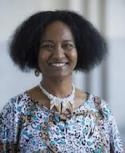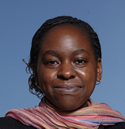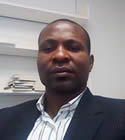
 Josephine Akihire, Makarere University
Josephine Akihire, Makarere University
Josephine Ahikire is Associate Professor and Dean, School of Women and Gender Studies, Makerere University. She has over eighteen (18) years of teaching Women and Gender Studies, Makerere University in the field of feminist theory, gender and politics, livelihood and cultural studies. She has key skills in policy analysis and wealth of experience in gender training and gender development practice. Ahikire has extensive experience in feminist research and has published widely in the fields of gender and politics, labour and cultural studies. Recent publications include a book entitled: Localised or Localising Democracy: Gender and the Politics of Decentralisation in Contemporary Uganda and another co-edited book entitled: Gender Poverty and Social Transformation: Reflections on Fractures and Continuities in Contemporary Uganda. She is also an Associate member of the African Gender Institute (AGI) and the Council for Development of Social Research in Africa (CODESRIA).
 Crystal Biruk, Oberlin College
Crystal Biruk, Oberlin College
Crystal Biruk is Assistant Professor of Anthropology at Oberlin College and a member of the Gender, Sexuality, and Feminist Studies Committee at the College. Her research and scholarship is at the intersection of critical global health studies, science studies, and African studies. She is finishing a book titled Cooking Data: Culture and Politics in an African Research World, an ethnography of knowledge production in foreign-led survey projects collecting AIDS-related health data in rural Malawi. The book considers the social lives of quantitative data, and analyzes how data reflect and cohere the social worlds they claim to represent. Her second ethnographic project takes interest in the emergence of same-sex identities and activism in Malawi, with particular focus on how LGBT people come to occupy, perform and know their vulnerability in the context of transnationally circulating human rights frames and rhetoric amid the AIDS epidemic. She has a PhD in Anthropology from the University of Pennsylvania and a BA in Anthropology from Bryn Mawr College, and held a postdoctoral fellowship at Brown University’s Pembroke Center in 2011-12. At Oberlin, she teaches courses in cultural theory, medical anthropology, science studies, and critical humanitarianism.
 Amanda Clayton, Vanderbilt University
Amanda Clayton, Vanderbilt University
Amanda Clayton is an Assistant Professor in the Department of Political Science at Vanderbilt University. Prior to joining Vanderbilt, she held a Postdoctoral Fellowship at the Free University of Berlin as well as a Research Fellowship at the Women and Public Policy Program at Harvard University’s John F. Kennedy School of Government. She received her Ph.D. from the Department of Political Science at the University of Washington in 2014. Amanda Clayton is an Assistant Professor in the Department of Political Science at Vanderbilt University. Prior to joining Vanderbilt, she held a Postdoctoral Fellowship at the Free University of Berlin as well as a Research Fellowship at the Women and Public Policy Program at Harvard University’s John F. Kennedy School of Government. She received her Ph.D. from the Department of Political Science at the University of Washington in 2014.Her work has appeared in or is forthcoming in Politics & Gender, Comparative Political Studies, International Organization, The Journal of Policy Analysis and Management, and Representation. Prof. Clayton has also consulted for the World Bank as well as research institutes in the US and Africa.
 Kara Ellerby, University of Delaware
Kara Ellerby, University of Delaware
Kara Ellerby is an Assistant Professor in the Departments of Political Science & International Relations with a joint appointment in Women & Gender Studies at the University of Delaware. She earned her PhD from the University of Arizona in 2011. Her research interests include global gender norms and equality, gender and security, African post-conflict peacebuilding and Feminist International Relations. She is finalizing a book manuscript with New York University Press titled The Problem With Gender Equality: Norms, Policies and the Politics of Women’s Inclusion. She teaches International Organization and Feminist International Relations Theory at the graduate level and Introduction to Global Politics, Gender and Politics and Introduction to Women’s Studies, and the Politics of Diversity for undergraduates
 Amal Fadlalla, University of Michigan
Amal Fadlalla, University of Michigan
Amal Hassan Fadlalla is Associate Professor of Anthropology, Women’s Studies, and Afroamerican and African studies at the University of Michigan. She is the author of Embodying Honor: Fertility, Foreignness, and Regeneration in Eastern Sudan (Madison: the University of Wisconsin Press, 2007) and the co-editor of the book, Gendered Insecurities, Health and Development in Africa (Routledge, 2012). She is also the co-editor of Human Rights and Humanitarianism in Africa, a journal issue forthcoming in Humanity, spring 2016. Some of her other publications appear in Signs, Urban Anthropology, Identity, and SAR advance seminar series. She is the recipient of many awards from the Rockefeller foundation, the Population council, the Harvard School of Public Health, the Woodrow Wilson Center for International Scholars, and the Human Rights and Humanity awards from the University of Michigan. She is currently finalizing a book manuscript on Sudanese activism in the diaspora.
 Jessica Gottlieb, Texas A & M University
Jessica Gottlieb, Texas A & M University
Dr. Jessica Gottlieb is an assistant professor in the Bush School of Government & Public Service at Texas A&M University. She earned her PhD in political science Master’s degree in economics from Stanford University. Her research and teaching interests include democratic accountability, political and economic development, and formal and informal norms and institutions – including those around gender. Much of her research has been in sub-Saharan Africa, where she has conducted field experiments, lab experiments, and surveys. Through studies in Mali, Senegal and Benin, her work examines the role of information asymmetries, social norms, and local leaders in undermining accountability in new electoral democracies. Her work is published or forthcoming in the American Journal of Political Science, World Politics, and British Journal of Political Science. Prior to her doctoral studies, Gottlieb worked at the Center for Global Development on a project encouraging international aid organizations and governments to better learn what works in development through improved impact evaluation.
 Sabrina Karim, Emory Univeristy
Sabrina Karim, Emory Univeristy
Sabrina Karim will start as an assistant professor in the Government Department at Cornell University in the fall of 2016. She is currently a doctoral candidate at Emory University. She is the co-authors of a forthcoming book with Oxford University Press entitled Equal Opportunity Peacekeeping (with Kyle Beardsley). She has forthcoming and published work relate to security, peacekeeping, and gender in International Organization, The Journal of Peace Research, International Interactions, and International Peacekeeping. A completely separate project, her dissertation, focuses on security sector reform (SSR) and post-conflict peace cross-nationally and in Liberia. She has conducted extensive fieldwork in Liberia and Peru, and employs multiple methods in her work including field experiments. She is a recipient of both the Fulbright Fellowship and the National Science Foundation Graduate Fellowship. She received her master’s degree as a Clarendon Scholar from Oxford University and her undergraduate degree from Georgetown University.

Martha Johnson is Assistant Professor of Government at Mills College, a liberal arts women’s college in Oakland, CA. She completed her PhD in Political Science at the University of California, Berkeley in 2009. She has conducted fieldwork in Senegal and Burkina Faso and speaks French and Wolof. She has published in Development and Change, Journal of Modern African Studies, Africa Today, and Development Policy Reviewon the topics of bureaucratic capacity, foreign aid, state-building, and livestock policy. Her current book manuscript asks how democratization and aid dependence impact bureaucratic capacity in Senegal. Her recent work with Leonardo Arriola examines women’s participation in executive politics across sub-Saharan Africa. Their findings regarding the negative impact of ethnic patronage politics on women’s political empowerment was published in the American Journal of Political Science in 2014, and their work on the type of ministerial appointments women receive in African countries wasshared in a Monkey Cage blog. Their current research examines the impact of restrictive economic laws on women’s political advancement.
 Sanyu Amimo Mojola, University of Colorado
Sanyu Amimo Mojola, University of Colorado
Sanyu A. Mojola is Associate Professor of Sociology at the University of Colorado Boulder. She is currently a sabbatical fellow at the W.E.B. DuBois Research Institute housed in the Hutchins Center for African and African American Studies at Harvard University. Her work examines the social structural production, maintenance and reduction of health disparities in the context of the HIV pandemic as it unfolds in various settings such as Kenya, South Africa and the United States. Her book “Love, Money and HIV: Becoming a Modern African Woman in the Age of AIDS” (University of California Press, 2014) won the 2015 Distinguished Book Award from the Sex and Gender Section of the American Sociological Association and was a 2015 finalist for the African Studies Association Bethwell Ogot Prize for Best Book on East African Studies.
 Basile Ndjio, Princeton University
Basile Ndjio, Princeton University
Basile Ndjio is Associate Professor of anthropology at the University of Douala, Cameroon, and currently a Member at the Princeton Institute for Advanced Study. His research deals with sexual and gender-based violence; sex, law and ethics; sexuality and politics; Chinese transnational sex labour migration, transnational organized crime, autochthony and the politics of belonging,global medicine and transnational healing processes; new wealth and occult economies, citizenship, leadership and governance, youth and marginalisation, etc. His most recent works include‘: ‘Sex and the transnational city: Chinese sex workers in the West African city of Douala’, Urban Studies journal (in press); ‘’Magic body’’ and ‘’cursed sex’’: Chinese sex workers as ‘’bitch-witches’’ in Cameroon, African Affairs, Oxford Journals(2014), 113, 452, pp. 370-386; ‘Sexualities and nationalist ideologies in postcolonial Africa’ in Saskia Wieringa and Horacio, F. Sivori, eds. Sexualities and modernity in the global South. Zed books(2013) pp: 120-143; ‘Postcolonial histories of sexuality: the political invention of a libidinal African straight,’ Africa/International African Institute, 82, vol.4(2012), pp. 609-631 .
 Lyn Ossome, Makerere Institute of Social Research
Lyn Ossome, Makerere Institute of Social Research
Lyn Ossome is Senior Research Fellow at the Makerere Institute of Social Research (MISR), and holds a PhD in Political Studies from the University of the Witwatersrand (Wits). Her research specializations are in feminist political economy, land and agrarian studies and political theory. Her current work in democratic theory deals with ideas of emancipation through a critical engagement with histories of women’s political activism, contemporary politics of representation, popular movements, queer histories, and human rights. In the area of land and agrarian studies, her current research is concerned with the agrarian question of gender equity, subsistence political economies, women’s work and reproductive labour regimes in the process of agrarian change.
 Graeme Reid, Women’s, Gender, and Sexuality Studies Program at Yale and Human Rights Watch
Graeme Reid, Women’s, Gender, and Sexuality Studies Program at Yale and Human Rights Watch
Graeme Reid, director of the Lesbian, Gay, Bisexual and Transgender Rights Program, is an expert on LGBT rights. He has conducted research, taught and published extensively on gender, sexuality, LGBT issues, and HIV/AIDS. Before joining Human Rights Watch in 2011, Reid was the founding director of the Gay and Lesbian Archives of South Africa, a researcher at the Wits Institute for Social and Economic Research and a lecturer in Lesbian, Gay, Bisexual, and Transgender Studies at Yale University. An anthropologist by training, Reid received an master’s from the University of the Witwatersrand, Johannesburg, and a PhD from the University of Amsterdam.
 Amanda Robinson, The Ohio State University
Amanda Robinson, The Ohio State University
Amanda Robinson is an Assistant Professor in the Department of Political Science at The Ohio State University. Her research interests are primarily in the field of comparative politics, and include the micro-foundations of national and ethnic identities, the relationship between culture and politics, and and the political implications of ethnic geography. Her primary region of interest is Sub-Saharan Africa, and she has conducted research in Malawi, Kenya, Liberia, Mozambique, Tanzania, and Zambia. She employ a variety of research methods, including original survey data collection, field experiments, lab in the field experiments, and GIS analyses. Before joining OSU in 2013, she completed a PhD in Political Science at Stanford University (2013) and a BA in Biology from Appalachian State University (2005).
 Olajumoke Yacob-Haliso, Babcock University
Olajumoke Yacob-Haliso, Babcock University
Olajumoke Yacob-Haliso holds a PhD in Political Science and currently teaches in the Department of Political Science and Public Administration at Babcock University, Ogun State, Nigeria. Her research has centred on African women in post-conflict situations, refugees and forced migration, gender and politics, and democracy in Nigeria. She is the recipient of research grants from the Harry Frank Guggenheim Foundation, the Canadian International Development Research Centre and the University for Peace Africa Program amongst others. Dr Yacob-Haliso was also a postdoctoral Global South Scholar-in-Residence at the Graduate Institute of International and Development Studies, Geneva, Switzerland in 2012. She is a member of the Society for Peace Studies and Practice (SPSP), the Council for the Development of Social Science Research in Africa (CODESRIA), the West African Political Science Association (WAPSA), The Liberian Studies Association (LSA), the American Political Science Association (APSA), the Global South Caucus of the International Studies Association (ISA), and so on. Dr Yacob-Haliso’s research has been published in respectable journals internationally and she also currently serves as editor of the Journal of International Politics and Development (JIPAD).
Yale participants include:
Alice Miller (Yale Law and Public Health)
Luisa Lombard (Anthropology)
Inderpal Grewal (Women’s, Gender, and Sexuality Studies)
Kathryn Lofton (Religious Studies)
